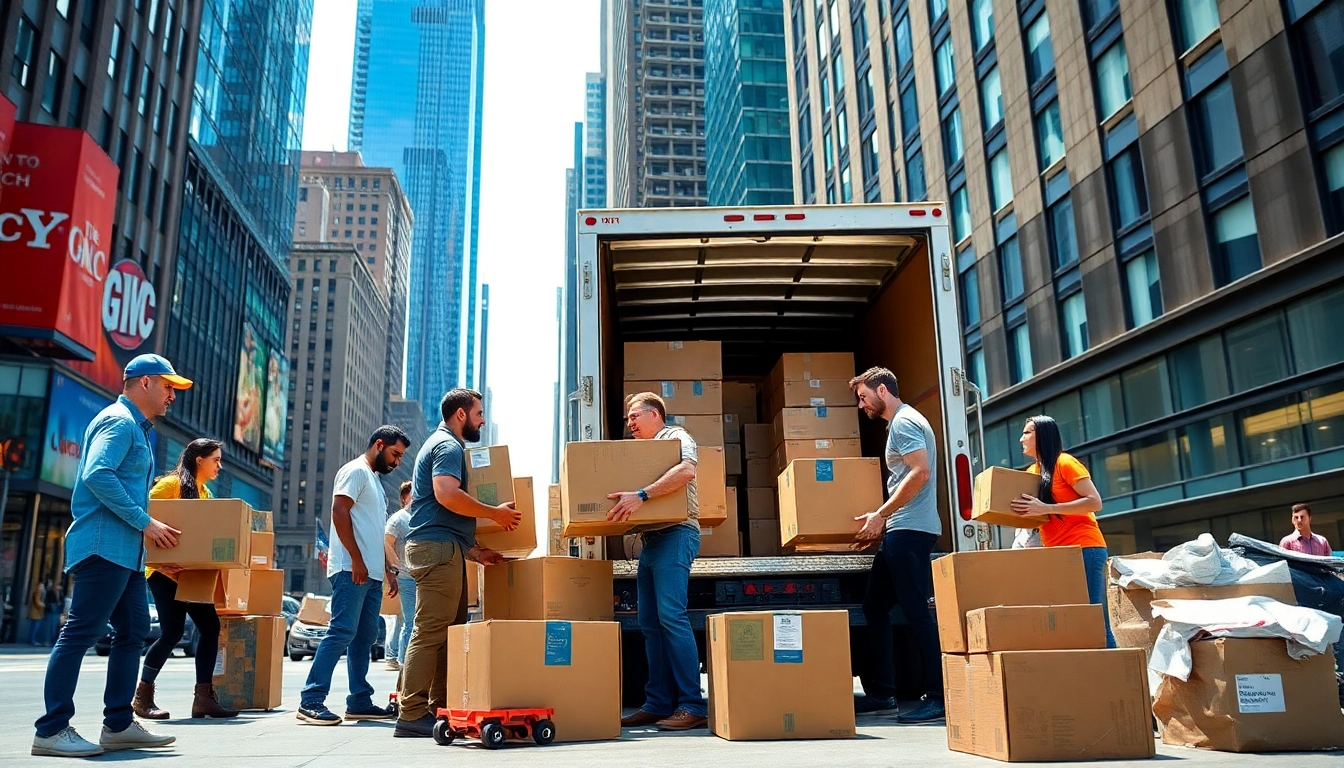
Your Trusted Moving Company NYC: Comprehensive Guide to Stress-Free Relocation
Understanding Moving Services: What a Moving Company NYC Offers
1. Types of Moving Services
Moving companies in NYC offer a variety of services tailored to meet the diverse needs of their customers. Understanding the different types of services available can help you decide what best fits your moving situation. Common services include:
- Residential Moving: This encompasses the relocation of households, including packing, loading, and unloading.
- Commercial Moving: Designed for businesses relocating offices or warehouses, this service often includes specialized equipment for handling heavier items like furniture and computer systems.
- Long-Distance Moving: Ideal for relocations outside the city or state, these services typically involve a different set of logistics and planning.
- Storage Solutions: Many moving companies also provide temporary or long-term storage options for those who need an extra space during their transition.
- Specialty Moving: For items that require extra care, such as pianos, artwork, or antiques, specialized services are available to ensure safe transport.
2. Benefits of Hiring Professional Movers
Engaging a professional moving company NYC can streamline the relocation process significantly. Here are several advantages:
- Time Efficiency: Professional movers are trained to pack and move efficiently, saving you valuable time.
- Expertise: Their experience with moving logistics can reduce risks and prevent damages to your belongings.
- Stress Reduction: Handling a move can be overwhelming. Professional movers can alleviate much of that stress through organization and planning.
- Equipment and Tools: They come equipped with the necessary tools and vehicles to handle your move safely and securely.
- Insurance Options: Most companies offer coverage plans that can protect your belongings during the move.
3. Cost Breakdown: How Much Does a Moving Company Cost in NYC?
The cost of hiring a moving company in NYC can vary widely based on several factors. Generally, you can expect to pay based on:
- Distance: Local moves are typically charged hourly, while long-distance moves often involve flat rates based on weight and distance.
- Time of Year: Peak moving seasons (late spring to early fall) may see higher rates compared to off-peak periods.
- Service Type: Additional services like packing, unpacking, and storage can increase your overall costs.
- Accessibility: If your location has difficult access points, additional fees may apply.
On average, a local move in NYC may cost between $200 to $2,000, while long-distance moves could range from $1,000 to $10,000 or more, depending on various costs involved.
Preparing for Your Move: Essentials Checklist
1. Decluttering Before the Move
Before you even start packing, it’s wise to declutter your home. This not only reduces the number of items you have to move but also ensures that you’re only taking what you truly need. Here are some strategies:
- Evaluate Your Belongings: Go room by room, assessing each item. Ask yourself if you really need it, if it brings you joy, or if it’s functional.
- Donate or Sell: Items that are in good condition but no longer serve your purpose can be donated or sold. This reduces the burden of packing and can provide extra funds for your move.
- Disposing of Waste: Properly dispose of items not suitable for donation or sale.
2. Packing Tips from Professionals
Packing efficiently can significantly reduce your moving day stress. Here are some professional packing tips:
- Start Early: Begin packing non-essential items several weeks in advance to avoid last-minute stress.
- Use Quality Supplies: Invest in sturdy boxes, packing tape, and bubble wrap to protect your items.
- Label and Organize: Clearly label each box with its contents and the room it belongs to for easier unpacking.
- Pack Room by Room: Focus on one area at a time to maintain organization and avoid chaos.
- Heaviest Items First: Place heavier items at the bottom of boxes to prevent damage.
3. Important Documents to Keep Handy
During a move, it’s essential to keep important documents secure and accessible. Create a dedicated folder for:
- Identification: Passports, driver’s licenses, and other forms of ID.
- Legal Documents: Lease agreements, property deeds, and contracts related to your move.
- Insurance Information: Policies for your belongings and new home, if applicable.
- Financial Documents: Bank statements, investment records, and anything relevant to your financial responsibilities.
Choosing the Right Moving Company NYC: Key Factors
1. Researching Reputable Movers
Not all moving companies are created equal. Start your search by researching credible movers:
- Check Credentials: Ensure that the company is licensed and insured. In New York, moving companies must have a valid Department of Transportation (DOT) number.
- Seek Recommendations: Ask friends, family, or colleagues for references. Online platforms can help discern the reliability of moving companies.
- Get Quotes: Compare rates from several companies to understand fair pricing and what services are included.
2. Checking Reviews and Testimonials
Customer reviews are invaluable in informing your decision. Look for:
- Recent Reviews: Consider the most recent feedback, as moving practices and personnel can change over time.
- Common Themes: Identify consistent positives or negatives, such as efficiency and customer service.
- Third-Party Ratings: Websites like the Better Business Bureau (BBB) can provide insights into the company’s standing.
3. Understanding Contracts and Insurance
Once you’ve selected a moving company, carefully review the contract. Pay attention to:
- Service Details: Ensure all services are detailed, including costs for packing, transportation, and any additional fees.
- Insurance Coverage: Understand your options for insurance during the move; it’s crucial for protecting your belongings.
- Cancellation and Rescheduling Policies: Know the procedures to follow in case you need to change your plans.
Moving Day Tips: Ensuring a Smooth Experience
1. Last-Minute Preparations
The day before the move requires some final preparations:
- Confirm Details: Double-check arrangements with your moving company, including the arrival time and any special instructions.
- Pack an Essentials Box: Prepare a box with everything you will need immediately upon arrival, such as toiletries and basic kitchen items.
- Prepare Payment Methods: Ensure you’re ready with any payment required for the movers, including tips.
2. Communicating with Your Moving Team
Effective communication can prevent misunderstandings and ensure a smooth process. Here’s how to communicate effectively:
- Introduce Yourself: Establish rapport with your movers, which can facilitate better cooperation.
- Provide Clear Instructions: Clearly explain any specifics about fragile items or particular concerns you have about the move.
- Stay Available: Keep your phone handy and be accessible to answer questions or provide directions.
3. Safety Tips to Follow During the Move
Safety should be a priority throughout the moving process. Consider the following tips:
- Stay Clear of Moving Areas: Keep pathways clear of obstacles and avoid being in the way of the movers.
- Watch for Overexertion: If you’re helping with heavy items, lift properly to avoid injury.
- Secure Your Pets: Keep pets in a safe and quiet area during the chaos of moving.
Post-Move Essentials: Settling into Your New Home
1. Unpacking Strategies for Efficiency
Once you’ve arrived in your new home, an effective unpacking strategy can help you settle in quickly:
- Focus on Essentials First: Start with rooms you use daily, such as the kitchen and bedroom, to create a functional living space ASAP.
- Unpack One Room at a Time: This can help you maintain organization and minimize chaos as you settle in.
- Use Labels: Refer back to labels on boxes to locate where items should be placed within your new home.
2. Connecting Utilities and Services
After you move in, make sure to get essential services up and running:
- Contact Utility Providers: Arrange for electricity, gas, and water services to be set up prior to your move-in date.
- Internet and Cable: Schedule installation with your service provider to avoid delays in connectivity.
- Change of Address: Don’t forget to update your address with the postal service and other essential services.
3. Making Your New Space Feel Like Home
Settling into a new home involves more than just unpacking; it’s about creating a comfortable environment:
- Personal Touches: Add decorations that reflect your personality to make your new space truly feel like home.
- Get to Know Your Neighbors: Introduce yourself and build a community in your new surroundings.
- Explore the Neighborhood: Familiarize yourself with your new community, including nearby shops, parks, and amenities.



